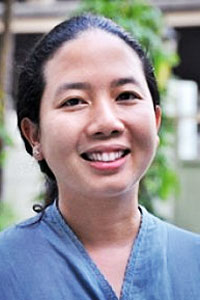
In a speech to parliament on Sept 11, Prime Minister Srettha Thavisin outlined policies, action plans and commitments that his government will take over the next four years for the "benefit and happiness of all Thai people".
Without disclosing much about what it will do to reach that point, the new government's policies do acknowledge the link between a clean and healthy environment and people's well-being and quality of life.
Mr Srettha promises to take care of the environment and pledged to give weight to public participation, especially on projects that affect natural resources, the environment and quality of life. Yet events in the following days serve as warning that government's promises can be hollow.
On Sept 13, as the cabinet held its first meeting, the Electricity Generating Authority of Thailand (Egat) signed a deal with China Datang Overseas Investment Co and Gulf Energy Development PCL on the Pak Beng hydro-dam project, to be built on the Mekong River.
It cannot go without saying that the deal was inked as the National Human Rights Commission was conducting a probe on the transboundary impact of the dam project in Chaing Rai the same week. An Egat representative informed NHRCs' hearing that the power purchase signing was being done in compliance with Egat-approved policy to acquire electricity, whether it is needed or not, for 29 years from 2033.
The Network of Thai People in Eight Mekong Provinces that participated in the NHRC's hearing in Chiang Rai wrote to Mr Srettha, asking him to have the Pak Beng project's power purchase agreement (PPA) revoked.
It says the project will cause transboundary and cumulative impacts on communities living along the Mekong River. It added the scheme is superfluous as the country has had a massive oversupply of electricity over the past few years.
Egat's signing of the Pak Beng PPA shows that economic interests come first -- not the rights and well-being of communities and the health of rivers.
There are four planned hydro-dams -- co-invested by Thai firms awaiting for Egat to sign. They are Sanakham, Pak Chom and Phou Ngoy dams to be built on the Mekong, and Ban Khum (Salawan) to be built on the Salween River. It's not only the Mekong that is under threat. Communities in the Salween basin fear the Yuam/Salween Water Diversion Project, which was endorsed by the previous government, will continue.
Mr Srettha learned about the project when cabinet visited the northern region on Sept 16. On that day, he was briefed by director-general of the Royal Irrigation Department about how the scheme will solve long term water scarcity in the Central region. He was briefed about technical details of the water scheme that divert 1,800 million cubic metres of water, about 60% of the total water from the western water basin to the Bhumibol Dam.
Despite the environmental impact of extracting massive volumes of water from the river basin system, the construction of a dam and underground tunnels in rich protected forest sites, the only question raised by PM Srettha was: "How long will it take to build this project?"
The People's Network of the Yuam-Ngao-Moei-Salween Basins also submitted a letter to the PM, asking him to revoke the project. The letter articulates long-standing concerns over the project's environmental and social impacts. It asks the government to revoke environmental impact study (EIA) because it is flawed and lacks meaningful participation by affected communities.
There have been reports in past few years about environmental and social impact from this 200-billion-baht water diversion project. The scheme requires dams, water irrigation and underground tunnels be built to divert water from the Yuam and Moei Rivers on western border of the Salween Basin to the Bhumibol Dam reservoir in the Chao Phraya Basin. Water projects will be built in five protected forests in Tak, Mae Hong Son and Chiang Mai. Meanwhile, indigenous Karen people fear the project will destroy the fragile ecosystems of the Salween River and its tributaries and threaten their way of life.
The government must listen to locals if it is genuine in its commitment to public participation, the environment and quality of life.
As a start, the government should walk the talk by stopping the Yuam/Salween Water Diversion Project, reversing this latest Pak Beng PPA and pausing future dam development until comprehensive studies and meaningful consultations are achieved. Acting on these demands submitted by communities will prevent the building of projects that are unnecessary for Thailand's energy and water security.
Pianporn (Pai) Deetes is Campaigns Director of the Southeast Asia Programme of International Rivers.
